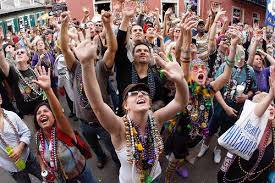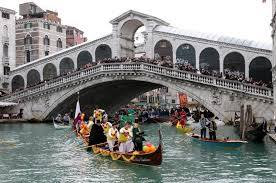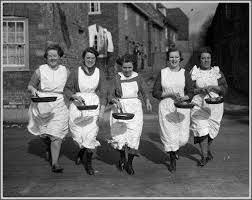Today is "Fat Tuesday" in the USA, "Pancake Day" in many other countries around the world. This is the day households and shops would rid themselves of all of the butter, lard, eggs and sugars that could not be eaten during Lent. Lent is the time of fasting and cleansing leading up to Easter. As with all religious holidays, this was taken/transformed from Pagan traditions to include the populous. How do YOU celebrate? Here are some interesting facts from around the world. In the United Kingdom, Ireland, Australia and Canada, Shrove Tuesday is known as "Pancake Day" or "Pancake Tuesday" due to the tradition of eating pancakes on the day.
Catholic and Protestant countries (outside those mentioned above) traditionally call the day before Ash Wednesday "Fat Tuesday" or "Mardi Gras". The name predated the Reformation and referred to the common Christian tradition of eating special rich foods before the fasting season of Lent.
For German American populations, such as Pennsylvania Dutch Country, it is known as Fastnacht Day (also spelled Fasnacht, Fausnacht, Fauschnaut, or Fosnacht).
In the Netherlands it is known as "vastenavond", or in Limburgish dialect: "vastelaovond", though the word "vastelaovond" usually refers to the entire period of carnival in the Netherlands.
In Portuguese-, Spanish- and Italian-speaking countries, among others, it is known as Carnival (to use the English spelling). This derives from the Latin carnivale ("farewell to the flesh")[8] and thus to another aspect of the Lenten fast. It is often celebrated with street processions or fancy dress. The most famous of these events is the Brazilian Carnival in Rio de Janeiro, while the Venetians celebrate carnival with a masquerade. The use of the term "carnival" in other contexts derives from here.
On the Portuguese island of Madeira they eat malasadas on Terça-feira Gorda (Fat Tuesday in English) which is also the last day of the Carnival of Madeira. The reason for making malasadas was to use up all the lard and sugar in the house, in preparation for Lent (much in the same way the tradition of Pancake Day in the UK originated on Shrove Tuesday). malasadas are sold alongside the Carnival of Madeira. This tradition was taken to Hawaii, where Shrove Tuesday is known as Malasada Day, which dates back to the days of the sugar plantations of the 1800s, the resident Catholic Portuguese (mostly from Madeira and the Azores) workers used up butter and sugar prior to Lent by making large batches of malasadas.
In Denmark and Norway the day is known as Fastelavn and is marked by eating fastelavnsboller. Fastelavn is the name for Carnival in Denmark which is either the Sunday or Monday before Ash Wednesday. Fastelavn developed from the Roman Catholic tradition of celebrating in the days before Lent, but after Denmark became a Protestant nation, the holiday became less specifically religious. This holiday occurs seven weeks before Easter Sunday, with children dressing up in costumes and gathering treats for the Fastelavn feast. The holiday is generally considered to be a time for children's fun and family games. (see Carnival in Denmark)
Shrove Tuesday, Bear guiding (pl) in Poland (1950).
In Iceland the day is known as Sprengidagur (Bursting Day) and is marked by eating salted meat and peas.
In Lithuania the day is called Užgavėnės. People eat pancakes (blynai) and Lithuanian-style doughnuts called spurgos.
In Sweden the day is called Fettisdagen (Fat Tuesday) and is generally celebrated by eating a type of pastry called semla.
In Finland the day is called laskiainen and is generally celebrated by eating green pea soup and a pastry called laskiaispulla (sweet bread filled with whipped cream and jam or almond paste). The celebration often includes sledging.
In Estonia the day is called Vastlapäev and is generally celebrated by eating pea soup and whipped-cream or whipped-cream and jam filled sweet-buns called vastlakukkel. Children also typically go sledding on this day.
In Poland, a related celebration falls on the Thursday before Ash Wednesday and is called tłusty czwartek (Fat Thursday).
In Slovenia Kurentovanje is also the biggest and best known carnival in Slovenia. There are several more local carnivals: for example in west Slovenia, a very well known carnival takes place in Cerkno. This carnival is usually referred to as Laufarija.
In some parts of Switzerland (e.g. Lucerne) the day is called Güdisdienstag, preceded by Güdismontag. According to the Duden (semi-official dictionary of the German language), the term derives from "Güdel", which means a fat stomach full of food.
personal chefs and event catering
Miami + Miami Beach + Fort Lauderdale + Palm Beach
info@yadachef.com | 954-367-YADA (9232)
fort lauderdale catering and personal chefs



